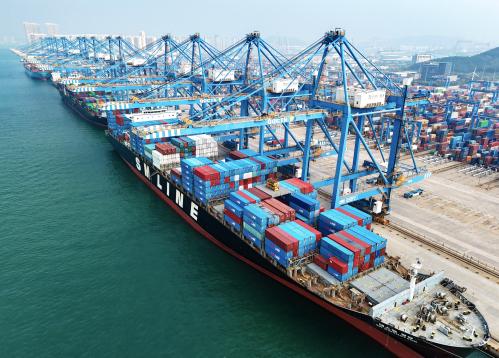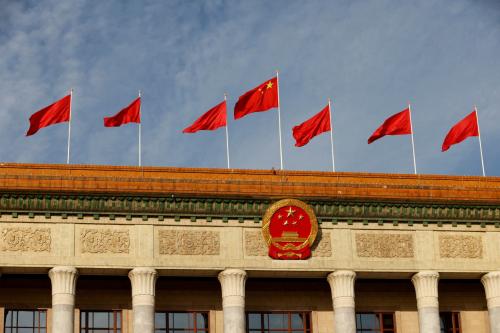President Biden and President Xi met on Wednesday in San Francisco during the APEC summit at a time of highly strained relations between China and the U.S. Patricia Kim discussed some of the outcomes of their meeting and stressed the need for Beijing and Washington “to depoliticize diplomacy and functional channels of communication and make them a regular feature of the U.S.-China relationship.”
TRANSCRIPT
PITA: President Biden and President Xi met on Wednesday in San Francisco during the Asia Pacific Economic Cooperation or APEC summit at a time of highly strained relations between China and the U.S. To fill us in on the expectations and outcomes of the meeting between the two leaders and potential effects on the trajectory of U.S.-China relations, we’ll be talking today with Patricia Kim, fellow with the Center for East Asia Policy Studies and the John L. Thornton China Center here at Brookings.
But before we get started, I want to let our listeners know about another podcast they might like. Every week on Foreign Policy Live, host and FP Editor-in-Chief Ravi Agrawal sits down with world leaders and policy experts on the issues that matter most to you. People like U.S. climate envoy John Kerry, economist Larry Summers, and Ukraine’s deputy foreign minister, Emine Dzhaporova. Whether it’s the U.S.-China relationship, the war in Ukraine, or the global South’s growing clout, Foreign Policy Live is your weekly fix for smart thinking about the world. Listen and follow wherever you get your podcasts.
Pattie, thanks for being with us today.
KIM: Sure, happy to be here, Adrianna.
PITA: So what were President Biden and President Xi’s priorities going into this meeting, and what came out of it ultimately?
KIM: Well, the summit, which was the first time that the two presidents had met since they last saw each other on the sidelines of the G20 in Bali. It was really organized around stabilizing the relationship and reopening diplomatic channels of communication that had worn thin over the course of the last year with a number of challenges that had hit the U.S.-China relationship, including the spy balloon crisis we saw earlier this year. Last August, after Speaker Pelosi made a visit to Taiwan, China had cut eight areas of cooperation with the United States, three of which involved dialogues between the two militaries. And so I think a priority, especially for the U.S., was restarting these dialogues.
Expectations were kept low on both sides. Before the summit, we were told not to expect any fundamental breakthroughs or changes in the relationship. And I think the outcomes largely aligned with these expectations. Essentially both presidents reaffirmed the importance of diplomacy and strengthening cooperation and channels of communication. Both sides are respectful, but at the same time, they firmly outline their positions in areas where the U.S. and China have fundamental disagreements, whether we’re talking about Taiwan or the South China Sea and or the East China Sea, as well as differences over human rights and economic issues. But I do want to note that there were indeed some positive outcomes as well, including a deal on cooperating on cracking down on fentanyl precursor chemicals, as well as the deal to restart the military-to-military channels that again were shut down last August.
PITA: I know those, the military-to-military channels especially, were a high priority, I think. But how significant were many of these other agreements?
KIM: Well, starting from the channels of communications, I think, you know, given the fact that Chinese and U.S. forces, as well as the forces of U.S. partners, are operating every day in close proximity to each other in hot spots in the Indo-Pacific, like the Taiwan Strait or the South China Sea, without clear channels of communication, it’s challenging to address miscalculations, misperceptions, and to reduce the risk of conflict. So I think it was significant that these dialogues were restarted.
I think the deal on cracking down on fentanyl precursor chemicals and narcotic equipments was a big win for the United States, given the number of Americans who die from opioids every year. And I think this is a concrete outcome that President Biden will be able to point to that he achieved by sitting down with President Xi that could resonate with everyday American voters. I think in the past, Beijing probably did less than it could do on fentanyl because it saw it as a U.S. problem, not a Chinese problem. And I think it saw little incentives to cooperate since its relationship with Washington was strained. I think now there’s a recognition in China of how important this is for the U.S. and how this really is in everyone’s interests around the globe to counter narcotics. And now that U.S.-China relations are on the upswing, I imagine that there’ll be more active efforts by China to do more on this issue.
Now I want to note that none of the agreements that were made are technically binding. So it’s hard to know how faithfully they will be implemented and whether these agreements can withstand the next crisis in the relationship. And I think the reality is it’ll take significant political commitment and efforts on both sides to build out the cooperative muscles that just don’t exist currently in the bilateral relationship.
PITA: China is, on its end, starting to face an economic slowdown, some pretty serious youth unemployment and I believe a housing market crisis as well as some other factors. How is that affecting their relationship?
KIM: Well, Adrianna, that’s right. I think the Chinese economy is not performing as well as expected with low business and consumer confidence. For the first time in decades, FDI, foreign direct investment into China turned negative. You mentioned there is record high youth unemployment, there’s instability in the real estate sector. They are facing looming demographic challenges. Just stepping away from the economy, there’s also been lots of turbulence in the Chinese political system with a striking number of high-level officials being dismissed in recent months, including the foreign minister and the defense minister, as well as two PLA commanders. There are also challenging events coming down the road with the Taiwan elections coming up in January and the U.S. elections coming up later on next year, which are all sensitive times for the U.S.-China relationship traditionally. So I think there was a recognition in Beijing that it would be in China’s interest to stabilize relations with the United States, especially since the health of China’s relationship with the United States often dictates the contours of its relationships with other U.S. allies and partners, many of whom are leading economic powers and also consequential for China’s economy and overall trajectory.
PITA: You just mentioned the need that both countries are going to need to build up their cooperative muscles to rebuild some of these connections. What sort of indicators do we have that is going to happen and be able to keep some of the momentum and the progress coming out of these meetings?
KIM: Well, that’s a really great question. And I think there are indeed concerns around whether the restored diplomatic momentum we see from this summit can withstand the next crisis in the U.S.-China relationship, which inevitably will come. And I think the concern is that if things break down again, the hurdles to restore channels of communication, to build upon these diplomatic muscles will be much higher than before. And there are certainly plenty of skeptics on both sides about the value of diplomatic engagement with China. So I think there’s a high bar set for both leaders, for both President Biden and Xi, to demonstrate to their publics that there are indeed concrete benefits to be reaped by diplomacy and restored channels of communication. I think on the U.S. side in particular, especially as we approach election season, it’ll be important for the Biden administration to show that there are substantive outcomes from the working groups that have been established between the U.S. and China, and that these clearly serve U.S. interests and that talking with China and cooperating with China doesn’t mean that the U.S. needs to make compromises on its national security interests or on its values. I think showing that balance will be very important. And again, this will take efforts on both sides, in both Beijing and Washington, to depoliticize diplomacy and functional channels of communication and make them a regular feature of the U.S.-China relationship, regardless of what the state of the relationship is.
PITA: There was a nice quote in, I think it was the Washington Post that reportedly, at least Chinese state media is reporting that, something that Xi said to Biden was, the world is big enough to accommodate both countries. Basically, this town is big enough for the both of us. So I think we’re certainly hoping that that’s a sentiment that will continue forward.
I thought I’d end on a note certainly of local interest here in Washington, D.C. Many families were a little saddened about the loss of the pandas going back to China. Was there any news on any future panda diplomacy resuming?
KIM: Well, I don’t think there was any news about pandas coming back to the DC zoo, and perhaps there may be in the future, but I think there was an official announcement that pandas would be coming to the San Diego Zoo in California, where the two leaders met. And so there’s something to look forward to there for Americans who like pandas.
PITA: All right, Pattie, thanks very much for talking to us today about this.
KIM: Sure, happy to be here.




Commentary
PodcastWill positive momentum from the Biden-Xi meeting last?
November 16, 2023